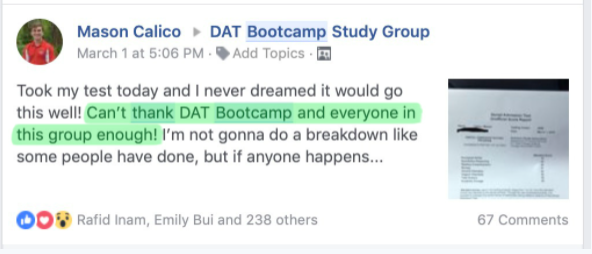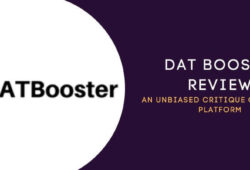As with any other test, the right preparation is the key to success in your DAT.
Most students get ready within 2-3 months. But some only have a month or so to study due to unavoidable circumstances.
Today I am going to show you in detail 1-month and 2-months DAT study schedules that will help you prepare efficiently for your DAT.
Before we start, I want to talk to you briefly about our ongoing offer that is exclusive for Test Prep Pal readers. We have a 10% off coupon on the best DAT prep course in this year, the one and only DAT Bootcamp.
Is 2 Months Enough Time to Study For The DAT?
Short answer, yes. Two months can be enough to study for the DAT.
I am not saying it’s going to be easier than if you started a bit earlier like three or four times before, but it’s certainly possible if you know what you’re doing.
This, of course, will depend on how fast you learn stuff. Some students can learn a new concept under an hour, while others struggle for hours.
Another important factor is your willingness to stay put and study for long hours without interruption. Nowadays, it’s near impossible to do this since we have that thing called “smartphone”.
Also, if you tend to forget what you read pretty fast, then it’s only logical that you leave only a few weeks of marathon studying up-to-the week/few days before your exam.
For some students, preparing for the DAT on a two months schedule may be the right thing to do since they tend to forget things faster than most people. For these people, preparing 6 months before the test will lead to them forgetting most of it right before the DAT test.
Another important thing to mention. Be prepared to study for long hours than people who started like 3 or 4 months before the due date.
The bottom line here is that two months is sufficient to get ready for DAT. But, let no one lie to you that it will be easy.
The fact remains that the lesser time you’ve to review all essential materials, the smarter you’ll have to work to meet your goals.
And the best way to be smarter is by purchasing an online DAT course that has everything you need under one roof with all the necessary tools to keep track of your progress.
We recommend DAT Bootcamp these days as it’s the course that has the highest number of positive reviews from students. You can check it out here (use code TESTPREPPAL10 for up to $90 off)
How Long Should I Study For The DAT?
Having dealt with this question several times, I would comfortably say that how long you need to study for DAT depends on your ability.
If you keep asking people for their opinions on a matter that will only affect your future and not theirs, then you might end up getting frustrated when the results don’t match your expectations.
Remember, everyone will tell you what they feel is right for them and not you.
And no matter how much others think they know you, you’re the only one who understands yourself best. Theirs will be subjective opinions. And yours will be an honest analysis.
Take time to evaluate yourself. Assess your previous exam experience. Which results did you achieve? And did they meet your expectation? What improvements could you’ve made if given a choice? What could you’ve done away with?
Your answers to the above questions will help you know which time-frame is sufficient to help you get ready for the DAT. And by this, I mean adequately.
Also, since DAT primarily focuses on sciences, how great you’re in them should give a clue of how long you should study.
The secret is to select a study plan/schedule that will allow you to not only work hard but also keep pushing until you’re 100% satisfied with all aspects of the DAT exam.
By so doing, you will gain confidence. And that’s one of the most important attributes you need to score highly.
So, I would be lying if I tell you to study for a month, 2 months, or even 4-6 months without knowing your capabilities.
But since you understand yourself better, I hope my explanation will help you comfortably settle into a study-routine that will benefit you 100% at the end of it all.
Remember, the keyword is to study A LOT!
If, after self-assessment, you find out that you’re okay with a two months study schedule, read the following section on how to build your study schedule.
DAT Study Schedule For 2 Months
Essential Things and Materials You Need
1. Prep Courses
I am not saying you can’t study for DAT without using prep courses.
But, it’s way easier and less stressful to pick up a well-organized course that has everything you need to study all in one place. Moreover, if you only have two months of preparation, then I think having a prep course becomes essential in my opinion. You just cannot risk it.
With a tight schedule, you cannot afford to be spending a lot of time jumping from one Youtube video to another. You will get lost in the mix of it and lose track of your progress.
Spending a few hundreds dollars in order to ensure your success in the DAT is a no-brainer.
This is your career we are talking about.
Once you become a dentist, you will be earning that in a few hours. (source)
Don’t know which online prep course to buy?
Do not worry.
I just did a review about the best DAT prep review programs in the market. Read about my picks here.
Here is a summary of my research in case you are in a hurry:
- Best Overall DAT Prep Course – DAT Bootcamp (use “testpreppal10” coupon code at checkout for 10% OFF)
- Best Live Online Course – Princeton Review (use this link for 100$ OFF)
- Best Affordable DAT Prep Course – DAT Booster (use “testpreppal” coupon code at checkout for 15% OFF)
- DAT Flashcards
Any smart DAT student working against time will tell you that Flashcards are a lifesaver. Well, literally.
They allow you to study wherever you are and at whatever time, making it easy to master vital concepts even when on-the-go.
Since most Flashcards come with a list of essential DAT questions, complete with a detailed explanation of their answers, they make it easy for you to study even with the help of a friend.
Most of the online courses come already with flashcards. So you do not need to buy them separately.
However, if you opt for buying a DAT prep book, then you might want to add to it some flashcards.
3. A Notebook and Pen
If you don’t have a tablet or aren’t comfortable with going through content using your smartphone, then a small notebook and a pen will come in handy.
Use it to note all your weekly observations (as you study) and solutions to arising problems. It makes weekly reviews easy and fast.
You can also use it to draft essential points for last-minute perusing, especially during the last week to exam.
First phase: Studying Content
This is typically 8 weeks of study, and it should be enough to help you properly study and attain a high score on DAT.
And the best way to do this is to take a diagnostic test at the beginning of week one, to help you determine your strengths and weaknesses.
Knowing this will determine how much time you allocate to each section. For instance, if you find yourself better in Biology and poor in Organic Chem, you will have to allocate more time to Organic Chem and less to Biology.
You can also alter your schedule every week, depending on the results of the practice tests that you’ll be taking at the end of each week.
So, in this 2-months study schedule, you will be studying for 5 days, do the practice test on day 6 and take time to review the results, and take day 7 off to rest.
And if you want to study for only 5 days, then you will have to increase the number of hours you study, to cover all the relevant areas. Allocate 3 hours for each section per day and focus on covering 4 chapters per day.
If you do this correctly, you should finish all the review materials by the end of week 6 and shift your focus on practice tests/questions for the remaining two weeks.
If you have a tutor or a study group, it’s advisable to meet on day six after the practice tests to discuss the results and strategize on the appropriate measures to take for the coming week.
- Week 1
Take the first few hours of day 1 to take a diagnostic test to help you know which areas are your strongholds and which parts aren’t.
Afterward, list essential concepts you must understand for a high DAT score and rank them according to familiarity. By the way, you should check out our free DAT score calculator that will help you know how you would score in the real DAT in advance.
Your schedule should look like this;
Biology: anatomy and physiology and developmental biology
General Chem: atomic and molecular structure
Organic Chem: nomenclature, stereochemistry
Perpetual Ability Test PAT): understand the various rules in each subtest and how to tackle them.
Quantitative Reasoning (QR): numerical calculations
Saturday: Practice test, Score Review
Sunday: Resting day
Note; Take an hour break between each section.
- Week 2
Your schedule should look like this;
Biology: cell and molecular biology
General Chem: periodic trends, and stoichiometry
Organic Chem: aromaticity and bonding
Quantitative Reasoning (QR): algebra
Saturday: Practice test, review of answers
Note; remember to take question problems at the end of each study session.
- Week 3
Biology: genetics; evolution,
General Chem: equilibrium, thermodynamics
Organic Chem: properties of molecules
Quantitative Reasoning (QR): Conversions
PAT: work on your speed and achieving accuracy in all areas.
Saturday: Practice test, review of answers
Sunday: Resting day
- Week 4
Biology: ecology
General Chem: kinetics, liquids and solids, and gases
Organic Chem: reaction mechanisms
PAT: work on your speed and achieving accuracy in all areas.
Saturday: Practice test, review of answers
Sunday: Resting day
Take 1 full-length practice test.
- Week 5-6
Biology: behavior, diversity of life
General Chem: solutions, redox reaction, acids and bases, and nuclear reactions
Organic Chem: all reactions
Quantitative Reasoning (QR): trigonometry, geometry, and probability and statistics
Saturday: Practice test, review of answers
Sunday: Resting day
Remember to increase the number of studies where necessary.
You can also reduce them, but that will mean you will have some sections to cover in week 7.
If everything section is covered by the end of week 6;
- Week 7-8
Review your practice test.
Take more question problems and 1 full-length practice tests.
Polish on your weak areas.
Take a day or two before the DAT relaxing and reenergizing.
Second Phase: Practice Tests
Ensure you take a practice test (questions) at the end of each week. More tests should come-up in weeks 7-8, as indicated above.
Remember to review the results and adjust your study time each week in favor of your weak areas.
Take the full-length tests in one sitting to give you a glimpse of your time-management skills. And this should be in week 7 or 8. The closer to the actual exam day, the better.
Aim at taking 6 full-length tests, at most. And three at least.
DAT Bootcamp comes ready with +60 full practice tests. Read about my detailed review about DAT Bootcamp here.
Third Phase: Tips on how to be ready mentally
- Concentrate on covering as many sections as possible. Then use the practice questions to measure what you’ve mastered. The ability to answer questions correctly gives you confidence.
- Rest as much as you can. That’s why I insist you take an hour’s break after each study session. Also, get sufficient sleep.
- Separate yourself from negative people. If they cannot boost your mental energy, then it’s better to be alone.
- Eat healthily and drink enough water. Your general well-being is primarily what you feed on. Too much sugar and caffeine aren’t good. Fruits, vegetables, and foods rich in Omega-3 will do you good.
- Visit the examination center, if possible, to get a picture of what to expect on exam day. Familiarize yourself with the environment.
How to study for the DAT in 1 month
If, for some reason, you find yourself stuck with only a month before DAT, then you’ve to work extra hard to prepare for the exam adequately.
The following sample study schedule should help you customize yours;
Like the 2-month study schedule, start your week 1 by taking a practice test for strength/weakness identification.
Afterward, plan to take problem questions at the end of each study-session and a comprehensive practice test at the end of each week.
Increase the hours of study to 5-6 per study-session. With a 1 hour break in between.
Use each day of the weekday to cover topics from four sections. Rest on the 7th day.
For instance;
- Week 1
Biology: anatomy and physiology and developmental biology
General Chem: atomic and molecular structure
Organic Chem: nomenclature, stereochemistry
Perpetual Ability (PAT): understand the various rules in each subtest and how to tackle them.
Quantitative Reasoning (QR): numerical calculations
Saturday: Practice test, Score Review
Sunday: Resting day
Note; Take an hour break between each section.
No full-length test this week. Take comprehensive problem questions and review the answers.
- Week 2
Biology: cell and molecular biology, evolution and genetics
General Chem: periodic trends, and stoichiometry, equilibrium, thermodynamics
Organic Chem: aromaticity and bonding, properties of molecules
Quantitative Reasoning (QR): algebra, trigonometry, conversions
Saturday: Practice test, review of answers
Sunday: Resting day
Take 1 full-length test on Saturday and review the score.
- Week 3
Biology: ecology, and behavior, diversity of life
General Chem: kinetics, liquids and solids, and gases
Organic Chem: reaction mechanisms, all reactions
Quantitative Reasoning (QR): trigonometry, geometry
Saturday: Practice test, review of answers
Sunday: Resting day
Use your PAT time to work on accuracy and time-management skills.
Take your 2nd full-length test
- Week 4
QR: Probability and Statistics
General Chem: acids and bases, solutions, redox reaction and nuclear reactions
Use a day for QR review.
Use the remaining days to polish on areas your weak areas and maximizing on your strengths.
Don’t focus on learning new concepts, instead focus on the ones you’ve already mastered and those that seem to give you problems.
Take a day to visit the examination center for physical analysis and familiarization of the place.
Take the day before the DAT off to relax. Enjoy your favorite activity to take your mind off the exam fever.
Also, don’t forget to keep your diet healthy and to sleep adequately.
FAQs about studying schedule for DAT
What is the best DAT prep course?
I think DAT Bootcamp is the most complete prep course right now.
We also have Princeton Review being the best if you prefer live online classes.
Another great resource is the DAT Booster which is more affordable and provides a great value for money. Use this coupon code in checkout to get 10% off: TESTPREPPAL
How many times can you take the DAT?
The best thing about DAT is that you can take the test as much as necessary to help you attain a desirable score.
But for more than 3 repetitions, ADA requires you to forward a school-going proof, to be allowed to take the test. Any evidence related to dental-progress will do.
How long does it take for DAT scores to be sent?
Immediately you finish the DAT; you will receive non-official preliminary results to help you have a clue of your score.
But the score is subject to change upon standardization.
So, expect to access the official results in about 3-4 weeks. If you had selected your dental schools of choice (which I advise you to do), the results would be forwarded to them.
Conclusion
In this article, I took you through a 2-moth DAT study schedule and also gave you a glimpse of what your 1-month DAT schedule should look like.
I, therefore, hope you find the content useful to confidently start your preparation without the restriction of time getting into your head.
Now, it’s time to start preparing. With the right amount of persistence and dedication, you can certainly achieve a +20 score on your DAT with no doubt.
Best of Luck!






